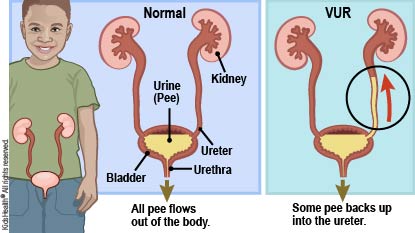Vesicoureteral Reflux: How to Care for Your Child
Urine (pee) normally flows from the kidneys down through tubes called ureters to the bladder. It leaves the bladder when a person pees. In kids with vesicoureteral reflux (VUR), some of the pee flows backward from the bladder into one or both ureters and kidneys. If the pee has bacteria in it, VUR can cause kidney infections. Repeated infections can lead to kidney damage and scarring.
VUR tends to get better over time, and many kids outgrow it. In the meantime, follow these instructions to help prevent infections and future kidney problems.


-
If your health care provider recommends that your child take antibiotics every day to help prevent infections, give it exactly as directed.
-
Some children with VUR also have constipation. If your child is constipated, follow the health care provider's recommendations for diet changes or medicines that can help.
-
Encourage your child to use the bathroom regularly, about every 2–3 hours when awake.
-
When going to the bathroom, girls should wipe from front to rear — never rear to front — to prevent germs from spreading from the rectum to the urethra (where pee comes out).
-
Schedule a follow-up appointment with your child's health care provider as recommended.

Your child:
-
begins peeing often
-
has pain with peeing
-
has foul-smelling, bloody, or cloudy pee
-
has pain in the lower back or belly
-
has a fever
-
is an infant and is feeding poorly or very cranky
-
is constipated
-
begins having accidents after previously being potty-trained

Your child has a fever with:
-
shaking chills
-
back pain
-
pain while peeing

Will my child outgrow VUR? As children get older, VUR often improves. Some kids completely outgrow it. Those with more severe reflux are less likely to outgrow it.
When is surgery needed for VUR? Surgery may be recommended if a child:
-
keeps getting kidney infections, even while taking antibiotics
-
has severe reflux that doesn't get better over time